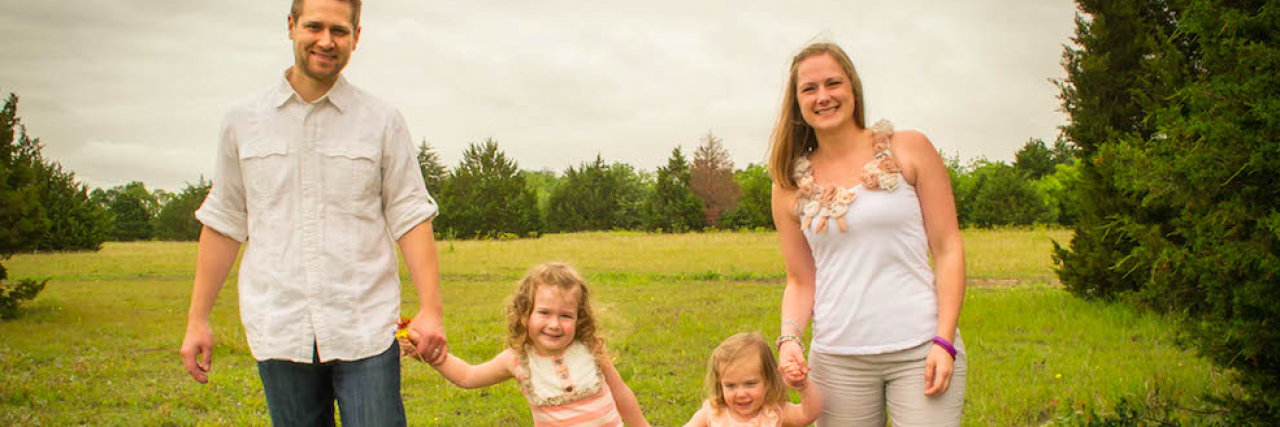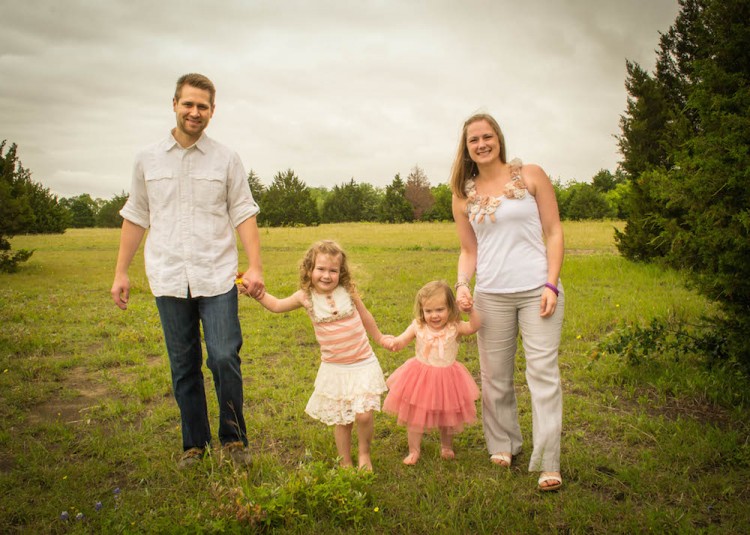We all have choices and decisions when it comes to our family planning, pregnancies, child-rearing. Just because we all do things differently, doesn’t mean any one way is wrong. I know my decision not to consent to an amniocentesis is one that might be criticized, but it’s a decision we made without any religious nor political influence. I’m not representing any group or stance; I’m simply representing my decision as it affected my family.
When I went in for my first OB visit for my third pregnancy, the office quickly learned of my 2-year-old daughter Adeline’s genetic history. I was immediately referred to genetic counseling, and an amniocentesis was scheduled. I was in the throes of first trimester exhaustion while raising two little girls, so by this point my head was spinning. Suddenly my pregnancy became frightening and somewhat worrisome rather than blissful and dreamy the way it ought to be — the way my others were.
Other relevant stories:
• Epilepsy Awareness Month
• What Does a Seizure Feel Like
• Epilepsy Life Expectancy
Adeline has a mutation in her SCN8A gene, causing epilepsy, hypotonia, ataxia, as well as learning and physical delays. She was diagnosed at 5 months old and against all odds, after two years of intensive therapy, she’s a walking, talking, sassy, almost typical toddler. Her life hasn’t been easy, and it’s taken a lot of work for her to get to the point she is now. She’s not without seizures, but she has a good quality of life. More important than any quantifier or score she receives on assessments is the fact that she’s happy.
Adeline’s struggles have molded me into the person I am today; in comparison to myself before her diagnosis, there are some things I care much more about while others I care about less (or not at all). Her strength has inspired me to push forward in my darkest days and has made me mother differently. She’s 19 months younger than her big sister and best friend, 4-year old Amelia. I truly can’t imagine either of them without the other. They have just always been.
The most common themes among posts on Adeline’s Facebook page are for epilepsy awareness, to motivate and inspire through her trials and triumphs and to express that Adeline (her challenges included) has been one of the greatest blessings of my life. To consent to an amniocentesis for my current pregnancy (which does carry a small risk of miscarriage) seemed contradictory to the messages I try to relay.
My husband and I have both undergone blood tests that are negative for the SCN8A mutation present in Adeline. There’s a chance that one of us has a germline mutation, meaning that a certain proportion of his sperm or my eggs could possess the mutation thereby creating the potential to pass it on to a certain proportion of our children. Prenatal testing by Chorionic Villus Sampling (CVS) or amniocentesis, which each carry their own risks to the fetus, are the only options available to test an existing pregnancy.
I can hear some people now:
“Why would you risk bringing another ill child into this world?”
“Why wouldn’t you have testing done to know so you could terminate your pregnancy?”
“Think about your other children and their needs!”
“Do you honestly think you have anymore time and energy to commit to a second medically complex child?”
“Aren’t you being selfish?”
The simple answer:
While those are all valid questions and points, if I had any deep-seeded concern with any of the above, I wouldn’t have gotten pregnant in the first place.
The more complicated but eloquent answer:
My girl is perfectly imperfect. Just like the rest of us. To seek testing and then consider terminating this pregnancy if this child does have the same mutation would be, in my opinion, sending a message to the world that Adeline isn’t perfect. That having a child like her is something to fear. That I wouldn’t have her all over again if given the choice. I can’t support nor condone those ideas.
The fight to show the public that my daughter is amazing, a gift, that she is perfection in my eyes has been a long journey. I’ve expressed that each of us is different in our own ways and because science labels something “abnormal” or “incorrect” or “mutant” doesn’t mean that parents have to.
While I would always hope (doesn’t everyone?) for a “healthy” or “typical” child, if I were to have another child with the same genetic mutation, I would now be equipped to seek therapy, medications, neurologists from birth. I will be able to recognize triggers for seizures and milestones that aren’t being met. I’ve already made the personal and scientific connections needed to give a child with SCN8A the best fighting chance. Who would be more equipped to raise this child than I am?
I would like to be romantic in thinking that even if my child were more medically fragile I would still make the same decision, but truth be told, I don’t know. How can I really know what I’d do if in a situation different than my own? I’m only equipped to handle the situation I find myself in, and I know this is what makes sense to me and what seems best for my family.
There are no guarantees that the same mutation means the same prognosis, but my focus would be the same as the focus I’ve always had for Amelia and Adeline alike: to raise them to have a happy childhood. Isn’t that one thing that unites us all? Isn’t that what we all really want? Every pregnancy comes with risks and every infant delivered has a chance for chromosomal or genetic abnormalities. I don’t consider this pregnancy any different than any other, and enjoying my pregnancy and seeing it through to the birth of the child I’m supposed to have is a risk “gift” I’m willing to take.
I’ve created lives for which I am neither ashamed nor afraid, but forever honored and humbled by the uniqueness and beauty they each gift to this world.
Image via contributor


